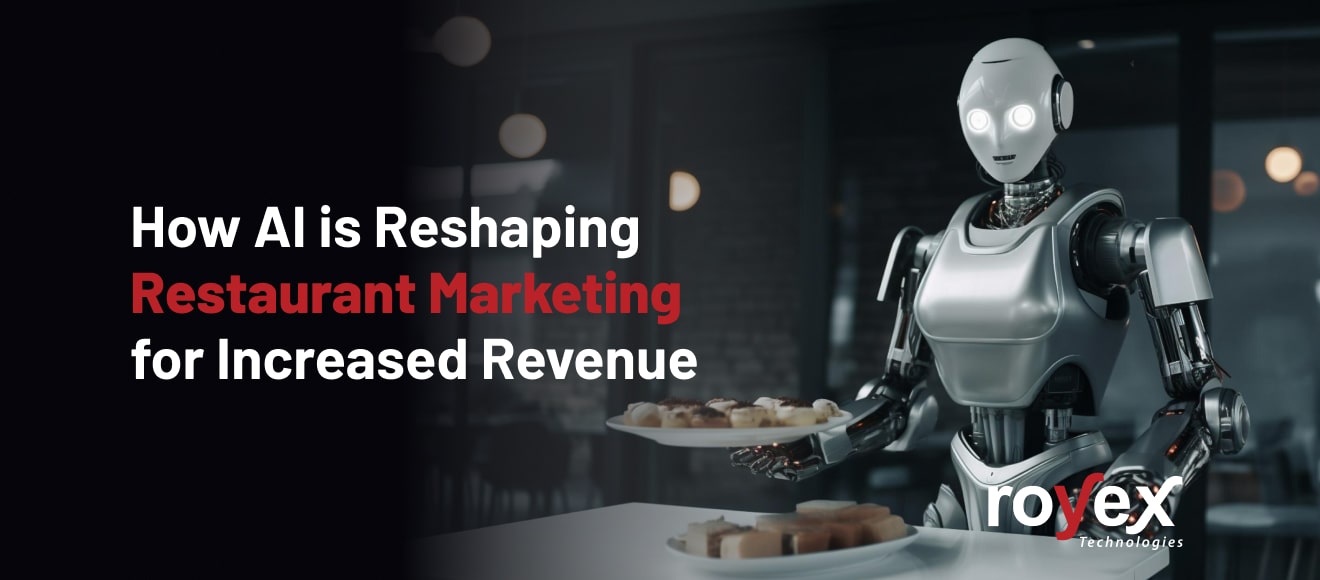
How AI is Reshaping Restaurant Marketing for Increased Revenue
The restaurant industry is more competitive than ever, with new dining options popping up regularly and customers expecting more personalized experiences. Traditional marketing methods like flyers, ads, or basic loyalty programs are no longer enough to stand out in this crowded market. Restaurant owners need smarter ways to attract customers, keep them coming back, and build a strong reputation. This is where Artificial Intelligence (AI) comes in as a game-changer. By leveraging the power of data and automation, AI gives restaurant owners the tools they need to stay ahead, offering insights into customer preferences, predicting trends, and crafting targeted marketing campaigns.
AI isn’t just about technology—it’s about transforming the way restaurants operate and connect with their audience. For example, AI can analyze customer orders to recommend dishes, create personalized offers based on dining habits, or even automate social media ads to reach the right audience at the right time. It can also help restaurants manage their inventory better, reducing waste and boosting profits. With these advanced capabilities, AI helps restaurants not only attract more customers but also build loyalty and increase revenue. In this article, we’ll take a closer look at how AI is reshaping restaurant marketing and why it’s becoming an essential tool for modern restaurant owners.
1. Personalized Recommendations

AI enables restaurants to study customer behavior and preferences. By analyzing data such as order history and dining habits, AI creates personalized suggestions for individual customers. This helps restaurants communicate with their customers in a way that feels personal and relevant. Instead of sending generic offers, AI tailors promotions to suit specific tastes and needs.
When customers feel that a restaurant understands their preferences, they are more likely to return. Personalized recommendations also build trust and loyalty, making customers feel valued. This approach not only increases customer satisfaction but also encourages repeat visits, which directly impacts the restaurant's revenue.
2. Better Social Media Engagement
Social media is an essential marketing platform for restaurants, and AI can make it more effective. AI-powered tools can analyze social media trends, helping restaurants decide what type of content will attract the most attention. By identifying popular themes or customer preferences, AI ensures that social media campaigns are more engaging and impactful.
AI also automates responses to customer inquiries on social platforms, ensuring quick and accurate communication. This creates a positive impression and builds stronger connections with customers. With AI managing social media engagement, restaurants can save time while maintaining an active and appealing online presence.
3. Smart Menus
AI helps restaurants create smarter menus by analyzing customer preferences and market trends. These menus can be adjusted based on factors like seasonality, inventory, or customer demand. For example, AI may suggest highlighting specific dishes to encourage customers to try something new or to focus on high-profit items.
By offering a menu that evolves with customer needs and market conditions, restaurants can optimize sales and enhance customer satisfaction. A well-organized, data-driven menu not only helps guide customer choices but also maximizes revenue by promoting the most popular or profitable items.
4. Efficient Loyalty Programs
AI takes loyalty programs to the next level by making them more dynamic and personalized. By analyzing customer spending patterns, AI ensures that rewards are meaningful and relevant. This makes customers feel appreciated, encouraging them to participate actively in the program and visit more frequently.
A well-designed loyalty program powered by AI strengthens customer relationships and increases long-term loyalty. When customers see that their loyalty is being rewarded in a thoughtful way, it builds trust and encourages them to recommend the restaurant to friends and family, further boosting revenue.
5. Accurate Customer Feedback Analysis

Customer feedback is crucial for restaurants, and AI can process it efficiently. By analyzing reviews and feedback from various platforms, AI identifies patterns and highlights areas that need improvement. This ensures that restaurants can address problems quickly and maintain high customer satisfaction.
AI also helps identify what customers love about a restaurant, providing valuable insights for marketing campaigns. By focusing on these strengths, restaurants can attract new customers while keeping existing ones happy. This feedback-driven approach not only improves services but also helps restaurants maintain a strong reputation.
6. Predicting Trends and Demands
AI helps restaurants forecast trends and demands by analyzing historical data and market behavior. It identifies patterns that allow restaurants to plan better, such as adjusting inventory levels or staffing schedules. This ensures that restaurants are always prepared to meet customer needs.
By understanding future trends, restaurants can stay ahead of their competition and offer what customers want. This proactive approach reduces wastage, improves efficiency, and ensures higher revenue. AI-driven predictions allow restaurants to operate smoothly and cater to customer expectations more effectively.
7. Chatbots for Customer Support
AI-powered chatbots provide 24/7 customer support, making communication easier and more efficient. Chatbots can handle common customer inquiries, such as menu details or reservations, without requiring staff involvement. This ensures that customers receive prompt responses, improving their overall experience.
By automating these tasks, restaurants save time and reduce the workload on their staff. Customers appreciate the convenience of quick and accurate information, which strengthens their trust in the restaurant. Chatbots play a vital role in enhancing customer service and building stronger relationships with diners.
8. Optimized Online Advertising
AI simplifies online advertising by targeting the right audience with precision. It analyzes data to determine which customers are most likely to respond to specific ads, ensuring that marketing efforts are focused and effective. This increases the chances of attracting new customers and boosting revenue.
AI also monitors ad performance in real-time, allowing restaurants to make adjustments as needed. This ensures that advertising budgets are used efficiently, avoiding overspending and maximizing returns. With AI managing online advertising, restaurants can attract more customers while keeping costs under control.
Conclusion
AI is transforming restaurant marketing by making it smarter and more customer-focused. From personalized offers to efficient customer service, AI tools help restaurants connect with customers in meaningful ways. By adopting AI, restaurant owners can improve their marketing strategies, enhance the dining experience, and increase revenue.
If you are looking for an AI chatbot app, Eyaana is the best choice for transforming restaurant marketing and boosting revenue. Eyaana helps restaurants connect with customers more effectively by offering personalized recommendations, instant responses to inquiries, and multilingual support to cater to diverse audiences. It can automate tasks like reservation management, order tracking, and promotional campaigns, saving time and resources for restaurant owners. With its user-friendly interface and pay-as-you-go pricing, Eyaana ensures that even small and medium-sized restaurants can leverage AI to improve customer engagement and drive sales. By making communication seamless and enhancing the overall customer experience, Eyaana is the perfect partner for restaurants aiming to succeed in today’s competitive market.





